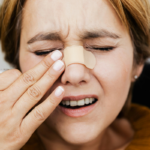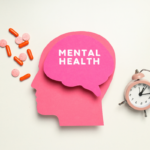
The Connection Between Vaping and Mental Health
Vaping has become increasingly popular in recent years. In addition to its potential impact on physical health, can this behavior also have a negative effect on your mental well-being? For example, does vaping make you anxious?
What Is Vaping?
Vaping is a form of smoking that involves using an electronic device to inhale aerosolized mist from an oily liquid that contains nicotine and other ingredients.
It’s also possible to vape a liquid that contains THC (which is the main psychoactive compound in marijuana), but today’s post will focus primarily on nicotine-based vaping.
The devices that people use to vape may be referred to by a variety of names, including vaporizers, vapes, e-cigarettes, and vape pens. The liquid is usually called vape juice or e-juice.
What’s in Vape Juice?
In addition to nicotine, the most common other substances in vape juice include propylene glycol, vegetable glycerol, and some type of flavoring.
However, according to the American Lung Association (ALA), the list of potentially toxic substances that have also been found in vape juice includes:
- Acetaldehyde
- Formaldehyde
- Cadmium
- Benzene
- Acrolein
- Diacetyl
- Diethylene glycol
- Lead
How Many People Vape?
In the United States, federal law limits the sale, possession, and use of vaping devices and vape juice to adults ages 21 and above. But neither national nor statewide prohibitions have prevented vaping from becoming a popular form of substance use among adolescents and teens.
The U.S. Centers for Disease Control and Prevention (CDC) has reported the following statistics about underage vaping:
- About 1.63 million high school and middle school students (or about 5.9% of that population) are current vape users. This includes 7.8% of students in grades 9—12 and 3.5% of those in grades 5—8.
- More than one fourth of students who vape (26.3%) use the devices every day.
- More than two thirds of young vapers (67.8%) told surveyors that they had attempted to quit at least once in the previous 12 months.
Among adults, the CDC has reported that:
- In 2020, about 9.6 million adults (or 3.7% of people ages 18 and above) were current vape users.
- By 2023, the rate of vaping among U.S. adults had increased to 6.5%, which equates to about 16.8 million people.
- Vaping is more common among men (7.6%) than among women (5.5%).
The continued popularity of vaping, combined with the potential toxicity of the substances that vapers inhale, has caused considerable concern about the potential physical and mental health ramifications of this behavior.

Does Vaping Make You Anxious?
Does vaping make you anxious or cause other mental health challenges?
Several studies have found associations between vaping and mental health concerns such as anxiety. But this doesn’t necessarily mean that there is a direct cause-effect relationship between vaping and anxiety. For example:
- A March 2022 study in the Hawai’i Journal of Health and Social Welfare reported that “higher depressive and anxiety symptoms and higher impulsivity were significantly associated with current cigarette and e-cigarette use.” However, the researchers noted that many people use nicotine to cope with depression and anxiety, and that poor impulse control has also been identified as a risk factor for smoking.
- A May 2022 review in the Journal of Community Hospital Internal Medicine Perspectives found a link between e-cigarette use and depression, suicidal thoughts, and suicide attempts among adolescents and young adults. The authors of this study noted that suicide attempts were “significantly higher among e-cigarette users compared to non-users.” They also noted that, while vaping may not cause these types of mental health concerns, e-cigarette use among smokers “can lead to a greater exacerbation of existing symptoms of mental illnesses.”
Also, in February 2023, the American Heart Association reported the following findings from an online survey of 2,505 teenagers and young adults ages 13—24:
- 60% of those who vaped nicotine, or who vaped both nicotine and THC, reported experiencing anxiety symptoms such as panic attacks and situational anxiety in the previous seven days. Among respondents who didn’t vape, the past-week prevalence of anxiety symptoms was 40%.
- More than 50% of all vapers said they’d had suicidal thoughts in the previous 12 months. Among non-vapers, the past-year rate of suicidal ideation was 33%.
- About 25% of respondents who vaped nicotine said they first engaged in that activity in an attempt to alleviate stress.
- About 33% of nicotine vapers said they currently did so as a means of coping with anxiety.
Turning back to the question at the beginning of this section, does vaping make you anxious, depressed, or suicidal? Researchers have not yet found a cause-effect relationship between vaping and these types of mental health concerns.
There seems to be little question that teens and young adults who vape have a higher likelihood of experiencing anxiety, depression, and suicidal ideation. And one of the studies cited above suggests that for some people, vaping can intensify the symptoms of some mental health disorders. But the data doesn’t support claims that vaping causes these concerns.
Find Anxiety Treatment in Philadelphia
Though researchers have not yet proved that vaping can cause anxiety, there is little doubt that this dangerous behavior is an unhealthy way of coping with anxiety, panic, and depression.
Thankfully, these mental health concerns are treatable. When you get appropriate care from a trusted provider, you can learn to manage your symptoms so that you can live a healthier and more satisfying life.
New Mind Wellness Center offers personalized outpatient treatment in a safe and highly supportive environment. Treatment options at our center in Philadelphia include a partial hospitalization program (PHP), an intensive outpatient program (IOP), and outpatient rehab.
We’ll work closely with you to identify the full scope of your needs, determine which program or programs may be most beneficial for you, and help you find your path toward a more hopeful future.
To learn more or to schedule a free consultation, please visit our Contact page or call us today.




